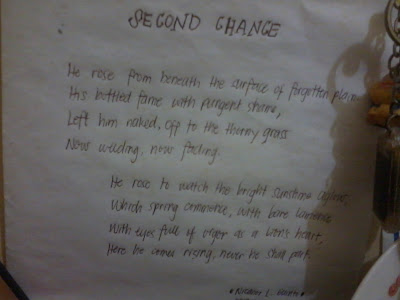I found this still posted on my bedroom wall, written in a yellowing half side of a legal-sized bond paper. This was the first English poem I wrote, and if my memory serves me right, the only one so far. I wrote this in our Stylistics class back in college. The requirement was to produce a short poem out of five words/ phrases we picked from a box with several strips of paper. The words/phrases I picked were: bottle, fame, vigor, lion's heart, and sunshine. Though this was a product of a time-bound activity, whenever I read this, it feels like I'm reading it again for the first time.
SECOND CHANCE
He rose from beneath the surface of forgotten plain.
His bottled fame with pungent shame,
Left him naked, off to the thorny grass
Now weeding, now fading.
He rose to watch the bright sunshine aglow,
Which spring commence, with bare lamence
With eyes full of vigor as a lion's heart,
Here he comes rising, never he shall part.
I can't exactly remember the emotion that triggered me to let out these words. But what I know is, I was then trying to prove something.




